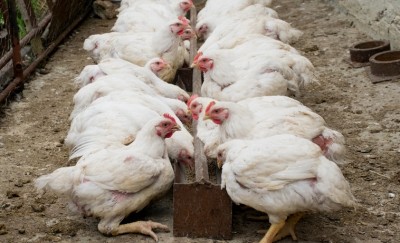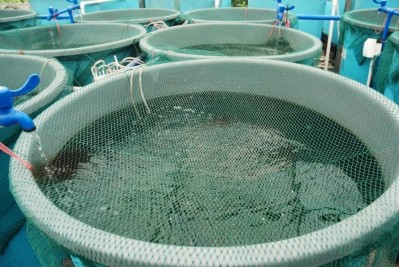Reports from EuroTier 2018
French firm looks to plant stimulation to develop phytobiotic substances

Essentially, its technologies work by releasing the active substance from the cellular matrix of plants. “Then we have a global encapsulation of this product,” said François Gautier, managing director of ID4FEED.
Its encapsulation approach protects the active substances and ensure release at the site of action in the animal’s gut, he said.
Background
At EuroTier last month, he told us about the background to the creation of the start-up.
ID4FEED was formally created as a French company in June 2017.
“Most of our shareholders are big distributors of feed additives, with contacts globally.”
It has offices in Annecy – its headquarters – also in Madrid and in Qingdao, China where it has a mixing unit for the Chinese market, he said.
The company has Andalusian roots; its origin was within leading Spanish plant extracts and essential oils player, BORDAS, which has a feed, food and cosmetics plant based ingredients manufacturing plant in Seville.
Gautier worked with that producer on a consultancy basis, developing its feed business, then shifting that business out of Spain, setting up HQ in Annecy last year.
ID4FEED still relies on that Spanish company, both technically and logistically.
Beyond BORDAS, he said ID4FEED has developed a network of other partners specialized in plant production and extraction in France, the US and in Asia.
Its plant extract technical partners grow plants for ID4FEED in Mexico or in the US, collect them and standardize the plants to a certain level of activity. Processing is done in Europe.
Plant stimulation
The concept for ID4FEED, though, arose out of his long experience as an industry insider.
“I used to work for Pancosma for nearly 20 years. I was in charge of its plant extracts product development work, on the marketing and general management side. I am also a food technologist by training, and, in terms of background, I worked also in the inulin, and the fructooligosaccharides business as well as in microencapsulation.
“When I left Pancosma in 2011, I took [inspiration] from my previous life to create something new, which is plant stimulation to develop phytobiotic substances on one side and new galenic technologies on the other. And I got a couple of grants from the French government [in relation to developing those two concepts].”
His grant proposal highlighted the increasing interest in the feed industry in the usage of plant extracts in animal nutrition but also noted is views on the limitations in the way companies were approaching product development in this field. “The market was confusing; the science behind it was quite poor. There were no actors in the industry extracting the product by themselves, they were all trading and blending companies.”
He thought it would be interesting to take a different route.
Secondary metabolites
“I knew some scientists that were working on the development of biopesticides. In biopesticide work, [researchers] are stimulating the immune defense of the plant and the plant produces some secondary metabolites related to defense, a kind of prebiotic that interacts with soil microorganisms.
“We know that many of these secondary metabolites are also acting on the microbiota in general. We were the first company, I believe, to think that we could transfer this technology from the plant to the gut environment.
“And the French government found the concept interesting enough to support it through a grant.”
Gautier also got an award from the French government in relation to a microencapsulation proposal: “Most of the industry is using fat as an encapsulation material and, in order to carry out fat encapsulation, the [tendency] is to use a spray-chilling process, whereby you spray a blend of fat with active ingredients into a tower, then you have a crystallization of the fat within the tower. However, it is very difficult to spray a highly viscous material, so I got a grant to develop some techniques based on modified extruders in which we decrease the temperature to crystallize the matrix.”
ID4FEED has now optimized these two concepts for use in animal diets, developing technologies to simulate and increase the production of secondary metabolites in plants, he said.
The company is continuing to invest heavily in research dealing with the interactions that exist between the environment, the plant, the animal and its microbiota through specific phytoalexins.
“We are working with labs, using metabolomics, to better understand what kind of secondary metabolites are produced and what is the effect of these substances [in animals in terms of] different aspects of immune stimulation, immune modulation, microflora management, and so on.”
Strategic partnerships
In France and abroad, he said ID4FEED has developed partnerships with many universities such as Queretaro in Mexico or Minneapolis in the US.
In the southeast of France, it collaborates with clusters of scientific and academic institutions to support its R&D work such as the University of Avignon, the University of Marseille, the Veterinary School of Marcy l’Étoile, and The Center of Natural Substances' Study in Lyon.
Gautier said the company has also developed a strong network and has done a lot of registration work allowing it to sell its products in various markets worldwide.















